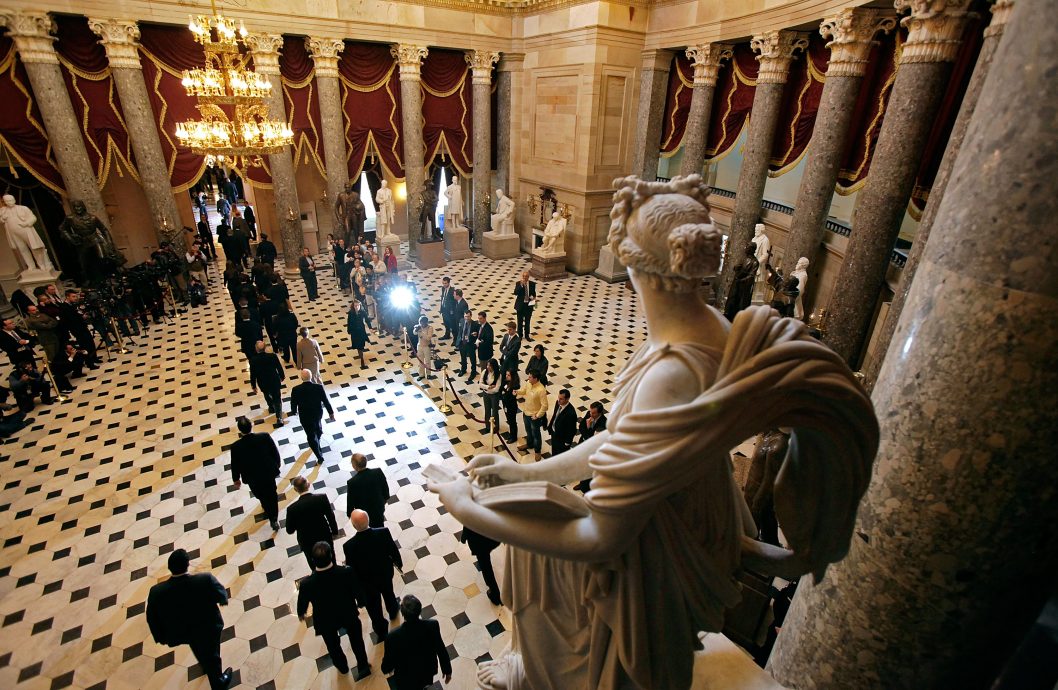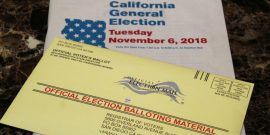American politics has reached the point where merely establishing the basic facts that frame our political debate takes us to the brink of crisis.
Electors, Americans, Countrymen, Lend Me Your Ears
On Monday, December 19, electors across America will be called upon to do their solemn duty of casting votes to choose the next President and Vice President of the United States, gathering in the capitals of all 50 states and in the District of Columbia. Together these electors, 538 in all, constitute the Electoral College, and it is their votes—to be officially tallied by Congress in January—that determine who will be inaugurated to the presidency and vice presidency on January 20. The electors themselves were chosen by popular election in the states on November 8, running as pledged to vote for one or another slate of candidates. If all the electors vote as pledged, and assuming that recounts do not disturb the current tallies, Mr. Trump and Mr. Pence will defeat Mrs. Clinton and Mr. Kaine by a vote of 306 to 232.
Why does the U.S. Constitution require that the President be chosen in this way? Although no one thinks the system works as it was intended or even expected to work by the Founding Fathers, it does seem clear that they had in mind several important aims that the system still achieves.
First, they meant for the President to be a constitutional officer, chosen for a limited time and governing according to law—neither a monarch, who claimed power without popular consent and employed it without regard to law, nor a demagogue, whose eloquence might so sway the masses that they would use him to work their will without restraint. Thus they meant for the President to be chosen by the people, but indirectly; the authoritative will of the people was to be respected, but popular passions would be cooled.
Second, they wanted to ensure that the executive would be independent of the legislative power, so they established an electoral body that existed only for a single purpose and in a sense for a single day and required that its members not hold other federal office.
Third, they wanted to avoid convulsion, conspiracy, and corruption, which had plagued the election of supreme rulers over history; hence they did not convene the College as a convention in a single place, but established that the actual vote would be dispersed.
Finally, they felt they needed to respect differences in the politics and the electorates of the different states; hence they left to the legislature of each state the choice of how to pick its electors.
Although some delegates to the Philadelphia Convention in 1787 that wrote the original Constitution supposed that the Electoral College would usually fail to pick a President and that as a consequence, the choice would typically be made according to the fallback mechanism (election by the House of Representatives, each state voting as a unit), in practice Americans quickly found ways to organize politically in order to succeed through the Electoral College. Thus national political parties were born, and proposed tickets for the presidency and vice presidency.
The Twelfth Amendment in 1803 separated the vote for these two offices (initially the VP was the runner-up for the presidency) and thus implicitly acknowledged the legitimacy of the fledgling party system. Originally, only a few states chose their electors by a popular vote, and as late as the eve of the Civil War, South Carolina chose its electors in the state legislature, as many had at first. By 1828, however, most of the states had begun to choose electors in a popular vote, pledged to national candidates, and most decided that whichever candidate won the plurality of votes in the state would win all its electors. In short, the election of the President became more democratic as the states democratized—a process that continued in the 20th century as votes were extended to women and the young and were more effectively guaranteed to African Americans. Except in 1800 and 1824, when a tie in one case and a crowded field in another threw the election to the House, the Electoral College has always produced a victor—although in 1876 and 2000, disputes arose over who were chosen as electors in Florida and, in the first instance, in several other states.
In recent years, the Electoral College system has come under attack, usually by people who think it would be better to choose the President by a direct, national popular vote. In 1969 a proposed constitutional amendment to that effect passed the House of Representatives but failed to come to a vote in the Senate because of the threat of a filibuster. In 1977 a similar proposal led to hearings in the Senate but passed neither House. In recent years, a proposal called the National Popular Vote has led 10 state legislatures and the D.C. Council to pass acts instructing their electors to vote for the winner of the national popular vote, regardless of the winner in their own state, provided similar legislation passes enough states to constitute an electoral majority, which to date it has not.
Why, in our age that celebrates democracy and the logic of one-person, one-vote, has the Electoral College retained the support of the American people?
First, I think Americans recognize that the laws of the states have already made the Electoral College democratic in the place where democracy has its surest home: the states themselves. Essentially, through the mechanism of the Electoral College, the same political sovereign that made and can change the Constitution—the people in their states—selects the highest officer under that Constitution. This has consequences that reverberate throughout the political system: States acquire a political identity on the national scene by the way they vote for President, and most candidates know from the very beginning of the campaign season (now perhaps as early as the day after the previous election) that they have to design their campaign strategy taking into account the peculiarities of all the states they hope to win. Minority interests easily overlooked when one treats the more than one hundred million American voters as a single mass command attention when at issue is the electoral votes of a decisive state. Can anyone think our whole system of state primary elections would remain without the counting of electoral votes by state?
Second, the Electoral College produces a clear result relatively quickly, usually magnifying a narrow but decisive victory and isolating any uncertainty or voter fraud to particular states, who after all are the ones who conduct even federal elections to this day. With only a few exceptions over 200 years, the Electoral College vote aligns with the aggregate vote, not accidentally but because it takes widespread popular support to win either, at least in practice. There is, moreover, something artificial about referring to a national popular vote under the current system, since voters decided whether and which way to vote by considering how their vote would affect the outcome, and of course candidates chose where and how to campaign by anticipating where they were most likely to garner the votes they needed given the rules in place.
Finally, the Electoral College brought into being, and is sustained by, the two-party system, encouraging the major competitors for the nation’s highest honor to join established coalitions with relatively clear platforms and thus offer voters a relatively clear choice, while encouraging the parties themselves to become vast coalitions that respect the immense diversity of our nation, rather than hardening into ideological polarities or splintering into multiple factions that might align more closely with individuals’ personal preferences but avoid the hard work of finding political partners and making political friends. Political moderation—the avoidance of extremism and the achievement of respect for interests and beliefs very different from one’s own—is promoted by an Electoral College that leaves no state forgotten except at a candidate’s peril. A national plebiscite, by contrast, would run roughshod over American traditions that link liberty to local self-government, the ability of communities to identify their own needs and craft solutions for themselves.
Members of the Electoral College, then, have the solemn duty to represent the plurality of the voters of their states for the single purpose of electing the next President. At stake is not only fidelity to the voters by whom they were chosen and to the laws of their respective states, but to the whole constitutional structure upon which our liberty depends.
(This essay is adapted from an address delivered at the meeting of the Louisiana Electors, December 17, 2012, in the State Capitol.)



